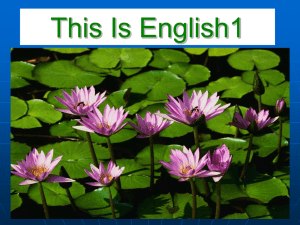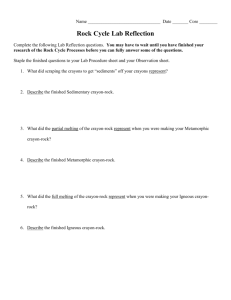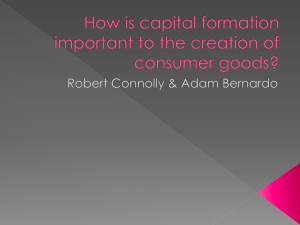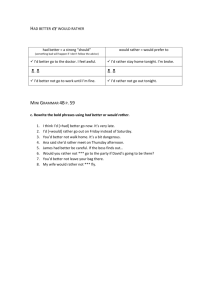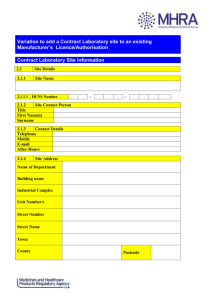future tenses
advertisement
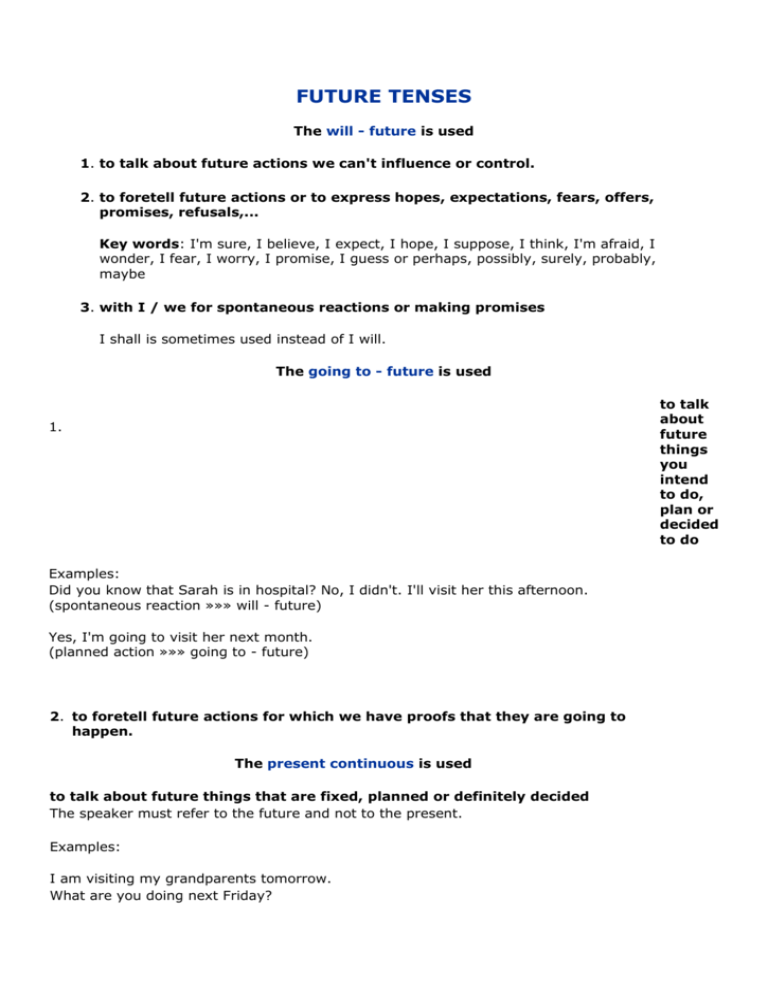
FUTURE TENSES The will - future is used 1. to talk about future actions we can't influence or control. 2. to foretell future actions or to express hopes, expectations, fears, offers, promises, refusals,... Key words: I'm sure, I believe, I expect, I hope, I suppose, I think, I'm afraid, I wonder, I fear, I worry, I promise, I guess or perhaps, possibly, surely, probably, maybe 3. with I / we for spontaneous reactions or making promises I shall is sometimes used instead of I will. The going to - future is used to talk about future things you intend to do, plan or decided to do 1. Examples: Did you know that Sarah is in hospital? No, I didn't. I'll visit her this afternoon. (spontaneous reaction »»» will - future) Yes, I'm going to visit her next month. (planned action »»» going to - future) 2. to foretell future actions for which we have proofs that they are going to happen. The present continuous is used to talk about future things that are fixed, planned or definitely decided The speaker must refer to the future and not to the present. Examples: I am visiting my grandparents tomorrow. What are you doing next Friday? The present simple is used to talk about times of arrivals and departures of traffic and times of events. Examples: The train leaves at 10.20. The bus goes at 8.30. When does the concert begin? FORM Future Continuous with "Will" [will be + present participle] Examples: You will be waiting for her when her plane arrives tonight. Will you be waiting for her when her plane arrives tonight? You will not be waiting for her when her plane arrives tonight. USE 1 Interrupted Action in the Future Use the Future Continuous to indicate that a longer action in the future will be interrupted by a shorter action in the future. Remember this can be a real interruption or just an interruption in time. Examples: I will be watching TV when she arrives tonight. I will be waiting for you when your bus arrives. USE 2 Specific Time as an Interruption in the Future In USE 1, described above, the Future Continuous is interrupted by a short action in the future. In addition to using short actions as interruptions, you can also use a specific time as an interruption. At midnight tonight, we will still be driving through the desert. We will be in the process of driving through the desert. USE 3 Parallel Actions in the Future When you use the Future Continuous with two actions in the same sentence, it expresses the idea that both actions will be happening at the same time. The actions are parallel. Examples: Tonight, they will be eating dinner, discussing their plans, and having a good time. Future perfect simple The future perfect is used to describe an event that will be finished by a particular time in the future. Form of the future perfect simple: will have past participle Affirmative Negative Interrogative I will / 'll have finished. I will not / won't have finished. will you have finished? NOTE: I will have finished = I'll have finished I will not have finished = I won't have finished Examples: I will have finished my English homework by the time my mother arrives. Will you have finished your English homework by the time your mother arrives? Use of the simple future simple: The Future Perfect shows that something will occur before: 1. another action occurs in the future 2. or before a specific time in the future. Examples: By the end of this weekend, I will have revised my lessons. By the time her husband arrives home, she will have prepared dinner. I won't have finished this task by the end of June Future Perfect Continuous: Future perfect continuous refers to a progressive event that will be completed at some point in the future. Here are the forms and uses of this tense. Form of the future continuous: will have been verb+ing Affirmative Negative Interrogative I will have been teaching. I will not/won't have been teaching. will you have been teaching? NOTE: I will have been teaching = I'll have been teaching I will not have been teaching = I won't have been teaching Examples: I will have been teaching for more than 35 years when I retire. Will you have been teaching for more than 35 years when you retire? Use of the future perfect continuous: It is used to show that an event will continue up until a particular event or time in the future. It is mostly used with an expression such as: for five minutes for two weeks These expressions indicate durations. Examples: She will have been working for over 8 hours by the time her children arrive. . He will have been studying English for three years next month. Put the verbs in brackets in the correct tense (future perfect simple or continuous.) 1. By 2018 we (live) in Madrid for 20 years. 2. He (write) a book by the end of the year. 3. (finish, you) this novel by next week? 4. He (read) this book for 15 days by the end of this week. 5. They (be) married for 40 years by the end of this month. 6. (be, she) pregnant for three months this week? Put the verbs into the correct form (future perfect simple). 1. By 9 o'clock, we (finish) 2. They (leave) 3. We (go) 4. She (return) our homework. the classroom by the end of the hour. home by next week. from the excursion by 6 o'clock. 5. (buy / he) the new house by October? 6. The sun (not / rise) 7. (you/do) by 4 o'clock. the shopping by 3 o'clock? Put the verbs into the correct form (future perfect continuous). 1. By the end of the month I (live) 2. By the end of this week we (work) month. 3. By July the fifth they (study) 6. We (look for) 7. They (wait) on the project for a English for 3 years. 4. By 10 o'clock she (watch) 5. She (sleep) in this town for ten years. TV for 4 hours. for 10 hours by 11 o'clock. him for 40 days by next Saturday. for the president for 5 hours. Simple future or future continuous 1. Sandra: Where is Tim going to meet us? Marcus: He (wait) for us when our train arrives. I am sure he (stand) on the platform when we pull into the station. Sandra: And then what? Marcus: We (pick) Michele up at work and go out to dinner. 2. Ted: When we get to the party, Jerry (watch) (make) drinks, Beth (dance) TV, Sam by herself, and Thad (complain) about his day at work. Robin: Maybe, this time they won't be doing the same things. Ted: I am absolutely positive they (do) do the same things. the same things; they always 3. Florence: Oh, look at that mountain of dirty dishes! Who (wash) those? all of Jack: I promise I (do) them when I get home from work. Florence: Thanks. Jack: When you get home this evening, that mountain will be gone and nice stacks of sparkling clean dishes (sit) in the cabinets. 4. Doug: If you need to contact me next week, I (stay) Hotel. at the Hoffman Nancy: I (call) you if there are any problems. Doug: This is the first time I have ever been away from the kids. Nancy: Don't worry, they (be) be fine. 5. Samantha: Just think, next week at this time, I (lie) beach in Maui drinking Mai Tais and eating pineapple. on a tropical Darren: While you are luxuriating on the beach, I (stress) out over this marketing project. How are you going to enjoy yourself knowing that I am working so hard? Samantha: I 'll manage somehow. Darren: You're terrible. Can't you take me with you? Samantha: No. But I (send) beach. Darren: Great, that (make) you a postcard of a beautiful, white sand me feel much better.

